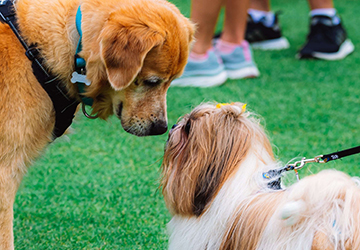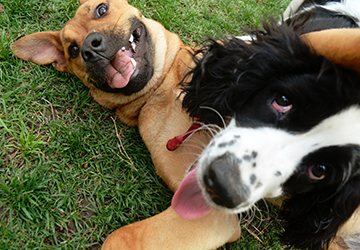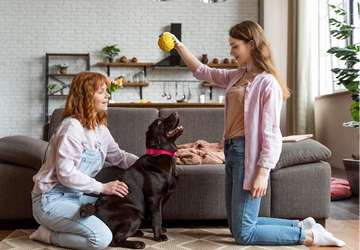How to Socialize Your Puppy with Other Dogs Safely
Safely Introducing Your Pup to Other Dogs
Getting a new puppy is a fun and challenging experience. During this time, socializing your puppy with other canine companions is crucial. Effective puppy socialization practices lay the groundwork for a dog's future relationship success.
This guide will explore the nuances of introducing puppies to older dogs, mastering puppy playdate etiquette, and ensuring safe dog interactions.
Proper Puppy Socialization Techniques
Puppies benefit significantly from early socialization, which includes meeting other dogs. It's about creating positive experiences with various stimuli, situations, and creatures:
● Start Early, but Safely: Begin socialization after your puppy's first vaccinations. This usually happens around 7-8 weeks of age.
● Positive Associations: Always associate new experiences with positive rewards. This could be treats, praise, or toys. The goal is to help your puppy form a positive attitude towards new experiences, including meeting other dogs.
● Diverse Experiences: Expose your puppy to dogs of different sizes, breeds, and temperaments. However, always ensure these dogs are well-behaved and patient with puppies.

Introducing Puppies to Older Dogs
When introducing puppies to older dogs, there's a balance to be struck. Older dogs can teach puppies vital social cues, but they might not always have the patience for a young pup's antics:
● Neutral Territory: First introductions should happen in a neutral space, like a park, to prevent territorial behavior.
● First, introduce the dogs by leashing them together and allowing them to sniff and watch each other from a distance. Reduce the time commitment gradually while keeping an eye on their reactions.
● Observe Body Language: Look for signs of relaxation or distress. Relaxed tails, playful bows, and wagging tails are positive signs. Growling, hair standing on end, or bared teeth are warning signs.
● Short and Sweet: Keep the first meetings brief and end positively, gradually increasing their duration.
Puppy Playdate Etiquette
Organizing playdates for your puppy is an excellent way for them to learn and practice their social skills. However, there's a certain puppy playdate etiquette to be followed:
● Know the Other Dog: Ensure the other dog has a temperament compatible with your puppy's energy levels and is up-to-date with vaccinations.
● Supervised Play: Always supervise playdates. Puppies can be rough or might not pick up on cues when another dog has had enough.
● Intervene When Necessary: If play becomes too aggressive or one dog seems scared or overwhelmed, it's time to separate and give them a break.
Ensuring Safe Interactions Between Dogs
The safety of both dogs should always be a priority. Here are some tips for ensuring safe interactions between dogs:
● Size Matters: Be cautious when introducing puppies to much larger dogs. Even if the giant dog is gentle, it might accidentally hurt the puppy during play.
● Stay Calm and Relaxed: Dogs pick up on human emotions. If you're nervous, your puppy might become anxious, too.
● Teach Basic Commands: Teaching your puppy basic commands like "come," "sit," or "stop" can be helpful during interactions. It gives you control over the situation if things start going south.
The Importance of Socialisation in Childhood
Puppies' conduct is heavily influenced during the first three months of their lives, sometimes called the "critical socialization period."
● Puppies are most receptive to novel experiences between 3 and 14 weeks old. If this opportunity is missed, it can lead to difficulties in adult social behavior.
● Confidence Development: A dog that has been well-socialized is more likely to mature into an assured canine who is at ease in a variety of settings, including a busy city street, a park full of youngsters, or a home with other pets.
● Preventing Behavior Issues: Early positive exposures can prevent the development of phobias, anxieties, and aggressive tendencies in adult dogs.

Challenges in Puppy Socialization
While socializing your puppy offers numerous benefits, it's not without its challenges:
● Overwhelm and Fear: It's possible to overwhelm a puppy with too many new experiences too soon. It's essential to gauge their comfort level and not force them into situations where they seem scared or anxious.
● Balancing Safety with Socialization: With puppies not fully vaccinated until around 16 weeks, owners are often wary of exposing them to other dogs. But with careful planning, such as organizing playdates with known, vaccinated dogs or attending puppy training classes, this challenge can be mitigated.
● Varied Experiences: It's not just about meeting other dogs. Puppies should also be exposed to various people, sounds, environments, and other stimuli. Managing such a broad spectrum of exposures can be challenging but is crucial for comprehensive socialization.
Long-term Benefits of Proper Puppy Socialization
Ensuring your puppy is well-socialized carries advantages that extend well into their adult life:
● Easier Vet Visits: Dogs familiar with being handled and meeting strangers are generally more comfortable during vet check-ups.
● Better Adaptability: Life is unpredictable. A well-socialized dog is more adaptable to changes, be it a house move, the introduction of a new family member, or travel.
● Reduced Aggression: Properly socialized dogs are less likely to display aggressive tendencies towards other dogs or humans, making public outings and interactions more enjoyable.
● Strengthened Human-Dog Bond: The time and effort you invest in socializing your puppy reinforces your bond. Engaging in socialization activities fosters trust, understanding, and mutual respect.
Conclusion:
Undeniably, ensuring your puppy undergoes proper socialization techniques is a fundamental pillar in cultivating a harmonious life for both pet and owner. As we guide our young canines by introducing them to older dogs or navigating the nuances of puppy playdate etiquette, we are not merely fostering friendships between animals but setting the stage for a lifetime of positive interactions and experiences.
Beyond the immediate joys of seeing our puppies play and interact lies the long-term vision of ensuring safe interactions between dogs of all ages and temperaments. Investing time and effort into early socialization paves the way for a well-adjusted, confident, and adaptable adult dog. Whether it's adapting to changes at home, greeting strangers with a wagging tail, or enjoying playful romps at the dog park without incident, the benefits of comprehensive socialization echo throughout a dog's life.




